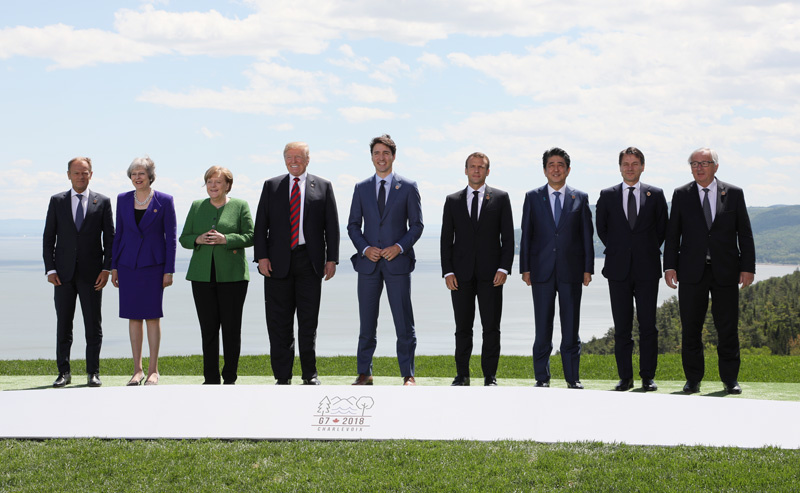Highlights
- Canada does not have the means and power to influence, let alone shape, the nature of the international system.
- Although Canada cannot influence the nature of the system by playing power politics with China, Russia or other rising powers, it can still aspire to impact its dynamics by working in small groups and with its alliance partners.
- Canada can mitigate the return to hard power politics in two ways: through regime building on specific security issues and by promoting institutional binding to protect the current order.
Context
There are multiple signs suggesting that the world is moving away from a US-dominated order. While it is too early to define this emerging world, it already poses serious challenges to the liberal international order, which has brought prosperity to Canada and the world for over 70 years. Canada must not only contend with the waning of America’s hegemony, but also face a return to the kind of hard power politics witnessed in Ukraine, Syria and the South China Sea. The question is whether Canada has what it takes to influence international relations in this new environment. And, if so, what are the areas where Canada can expect to play a constructive role?
The Nature and Dynamics of the International System
The international system gathers states performing different roles based on a combination of material power and the perception they hold of their own place in it. With this in mind, Robert Keohane, a well-known professor of International relations, came up decades ago with a typology of behaviour that is highly relevant today for understanding Canada’s place in a transforming world order. Keohane’s first category is composed of “system-determining” states or superpowers. States that are powerful enough to shape the nature of the international system and dominate it through military might and the size of their economies. The United States, and most likely China in the 21st century, fall into this category. Graham Allison’s Destined for War is a reminder that Americans and Chinese are the great rivals at the top of the international structure and that a war between them over the nature and domination of the system remains a possibility in the 21st century. “System-influencing” states make up Keohane’s second category, referring to countries that cannot dominate the system but can still influence its nature. France, Russia and the United Kingdom, being nuclear powers and permanent members of the UN Security Council, would currently come under this category. Russia’s annexation of Crimea or France’s opposition to the US war in Iraq in 2003 remind us that even if they cannot dominate the system, these states must be taken seriously because they have the power to influence it through unilateral actions.
But what about Canada? Canada falls under Keohane’s third group: the “system-affecting” states. Countries that cannot shape or influence the nature of the system but can have an impact on its dynamics by working in small groups within international organisations. This is how Canada was able to exert influence in the past. Canada helped reduce international tensions during the Cold War and has been successful at influencing states’ behaviour through norm promotion since then. By working with others today, Canada can perhaps seek to mitigate power politics by overcoming new sources of anarchy, and by defending the current international order through regime building and institutional binding. After all, norms, rules and institutions are just about all Canada has at its disposal to ensure its security and prosperity in the 21st century.
Considerations and Recommendations for Canada
International regimes set the limit between conformity and deviance in international relations and their underlying norms exert social pressures on states to comply with expectations. Armed with this knowledge, Canada should promote new security regimes to compel great powers to comply with new norms with the goal of reducing their temptation to rely on unilateral actions.
Canada Should Regulate LAWS
One source of anarchy that must be overcome is the lack of regulation over the use of lethal autonomous weapons systems (LAWS). These weapons are transforming our relationship with security, war and peace and have the potential to bring about a dramatic shift in the transforming world order. Experts are now predicting that fully autonomous weapons systems – military devices that are able to select targets without direct human intervention – could be operational in the very near future. This possibility raises security concerns in a system that is increasingly fragmented and where hard power appears to be on the rise. The good news is that fully autonomous weapons have yet to be created and that international discussions on their use are already underway at the United Nations in Geneva. Over the last six years, Canada, alongside many other nations, has participated in numerous meetings at which the legal, ethical and technical aspects of this issue have been addressed. The bad news is that several states, including China, Russia and the United States, are working on developing these weapons. Moreover, after years of discussions, experts still cannot agree on the technical definitions, notably regarding what constitutes “autonomy”. This lack of consensual definitions is preventing the UN from progressing towards an international regime that could legally constrain the use of LAWS and limit potential drifts. In the meantime, however, research and technology are progressing rapidly.
Several states have already called for a preventive ban treaty on LAWS (e.g., Columbia, Pakistan, many African states) while others are calling for a legally binding regime to ensure human control over some of their specific functions (e.g., Austria, Brazil and Chile). Meanwhile, an international campaign to stop these weapons (the Campaign to Stop Killer Robots) has garnered the support of more than 80 national and international NGOs, such as Human Rights Watch and Amnesty International. However, many governments are opposed to a legally binding regime. Some of them would settle for a political declaration on the need for human control and accountability (e.g., France and Germany), while others are simply opposed to any measures that would constrain their use of these weapons (e.g., the United States, Russia, Israel, Australia).
Recent developments suggest that the Canadian government takes this issue seriously. Canada’s Foreign Minister Champagne’s mandate letter issued in December 2019 indicates that the minister must “[a]dvance international efforts to ban the development and use of fully autonomous weapons systems”. Since then, however, the government has not issued a formal statement supporting a ban against these weapons.
Canada should seize on this opportunity to join, or even lead, a multilateral effort to ban the use and production of LAWS that would operate without a meaningful level of human control. This could be a significant way for a system-affecting state like Canada to impact the dynamics of the emerging world. Canada has four main assets here. First, it is known not to be developing fully autonomous weapons and is therefore well positioned to act as a legitimate actor. Second, Canada has well-known expertise as a norm-building entrepreneur and invested in significant multilateral initiatives in the not-so-distant past. The Ottawa Mine Ban Convention and the International Commission on Intervention and State Sovereignty attest to the fact that, with political will, Canada can be an important “system-affecting” state. Canada has already demonstrated that it knows how to bring states together and build consensus. Third, Canada is a member of several organizations including the G7, G20, NATO, APEC, the Commonwealth and the Francophonie. These institutions could be used as force multipliers to amplify Canada’s effort and increase its chances of success. Fourth, Canada is a nation of both the Atlantic and Pacific. Over the years, it has maintained close ties to both “system-influencing” and “system-affecting” states, in Europe and the Pacific region, mainly for cultural and security reasons. Canada could thus capitalize on this advantage to facilitate coordination with like-minded nations and pressure close allies, notably, France, the United Kingdom and Australia, to join in such a regime of cooperation.
Some observers will argue that since UN discussions on LAWS have already been underway for years, Canada and its allies should simply stay away from this issue. However, it is relevant to look at what transpired with the negotiations on landmines at the United Nations Convention on Conventional Weapons (CCW) in the 1990s. System-affecting states such as Canada, Norway and Belgium were frustrated by the UN consensus-based system, benefitting great powers that did not favour a ban on these weapons. Discussions were dragging on and negotiators were looking to find the “lowest common denominator” to reach a consensus. This led Canada to push for a new regime negotiated outside of the United Nations. Ottawa was initially able to bring together many system-affecting states and NGOs and eventually, through effort and leadership, more than 120 countries, including the United Kingdom, France, Germany, Australia and Japan, signed the Ottawa Treaty. This case shows that when political leadership is exercised, system-affecting states can indeed impact the dynamics of the international system.
Canada Should Defend the International Order by Intensifying Institutional Binding
Change in the distribution of power does not automatically imply change of international order. The relative decline of the US hegemonic power does not necessarily mean the end of western liberal hegemony if a key group of powerful states collectively ensures the sustainability of this order. While Canada and other “system-affecting” allies such as Germany, Italy, Japan, and the MIKTA countries, cannot stop systemic transformations from occurring, they can potentially preserve the current order, or at least slow its demise, by teaming up with “system-influencing” states such as the United Kingdom and, more importantly, France, which exerts strong political leadership within the European Union. For this to happen, however, this group of states would have to better coordinate their efforts and exert greater leadership within international institutions, notably within the WTO and the G20.
These states could promote institutional co-binding to overcome power politics and zero-sum games. In the words of Daniel Deudney and John Ikenberry, the strategy of co-binding intends to tie “one another down by locking each other into institutions that mutually constrain one another. […] This binding practice was significantly and independently motivated by an attempt to overcome anarchy and its consequences among the Western states” in the 20th century. This practice is especially important with respect to threatening powers such as China and Russia, as institutional binding would tie these states down into acceptable patterns of behaviour, possibly reducing their temptation to rely on unilateral actions.
The idea here is not to rely on institutional counterbalancing within the G20 or the WTO to block and harm China or Russia. Focusing on coercive measures against Beijing or Moscow within these forums would be counterproductive. Such measures would simply alienate these states and increase their incentives to create an alternative to the current liberal order. To paraphrase Joseph Nye, system-affecting and system-influencing liberal states must hone their ability to shape the preferences of great powers through appeal and attraction rather than coercion. They must help bridge divides and build consensus within these institutions. Once again, Canada could be opportunistic and benefit from its comparative advantages to promote co-binding. As an Atlantic/Pacific nation, it could not only increase coordination with its Five-Eyes, G7 and NATO partners, but could also move closer to the MIKTA countries, which openly work to bridge divides through consensus building with the aim of preserving the current world order.





Comments are closed.